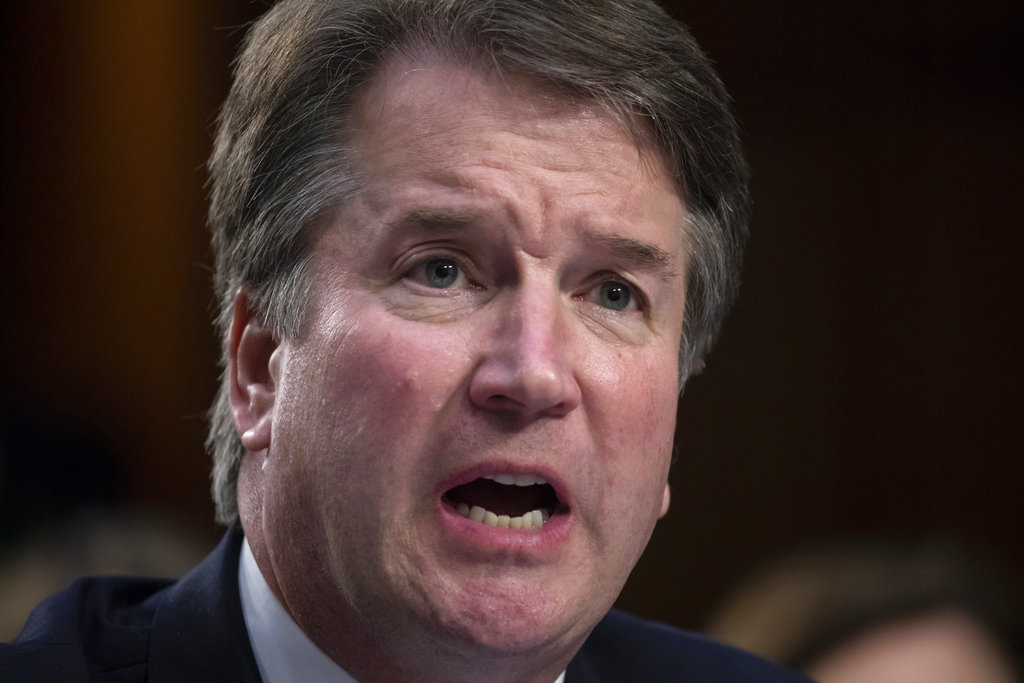The hypocrisy of Brett Kavanaugh
Published 12:37 am Tuesday, September 25, 2018

- Brett Kavanaugh, President Donald Trump's Supreme Court nominee, appears before the Senate Judiciary Committee on Sept. 5, 2018. (AP Photo/J. Scott Applewhite)
By Helaine Olen
Special to The Washington Post
Now that a second woman, Deborah Ramirez, has stepped forward to accuse a drunk, teenaged Brett Kavanaugh of gross sexual misconduct, The Washington Post’s weekend piece recounting the behind-the-scenes prep he’s undergoing to prepare him for his expected testimony later this week in front of the Senate Judiciary Committee takes on even more resonance.
In short, Kavanaugh wasn’t interested in answering questions about his past:
“But Kavanaugh grew frustrated when it came to questions that dug into his private life, particularly his drinking habits and his sexual proclivities, according to three people familiar with the preparations, who requested anonymity to discuss internal deliberations. He declined to answer some questions altogether, saying they were too personal, these people said.”
Though Kavanaugh has vehemently denied the women’s accusations, the hypocrisy and lack of self-awareness are staggering. First, of course, is the obvious: Kavanaugh, by late last week, was most likely aware of the rumors swirling that at least one other woman was going to step forward to accuse him of misconduct.
But there is something else worth remembering, too. Kavanaugh was not only a part of special counsel Ken Starr’s investigation into President Bill Clinton’s relationship with Monica Lewinsky; he was also one of the lead Torquemadas of it — zealous in the pursuit of his goal to the point of cruelty. If Kavanaugh’s nomination survives till Thursday’s scheduled Senate Judiciary Committee hearing, at least one senator should ask him why he thought it was so necessary to ask Clinton such graphic questions about Lewinsky.
Let me be clear: Kavanaugh not only thought Clinton needed to be questioned about his relations with Lewinsky; he also wanted Clinton to be interrogated in the most detailed and specific way possible. He drew up a memo with a series of 10 sexually explicit questions about Clinton’s relationship with Lewinsky. He claimed he wanted to establish Clinton had no defense for his “pattern of behavior.” As a result, “[the] idea of going easy on him at the questioning is thus abhorrent to me,” Kavanaugh wrote in the summer of 1998.
To say that the questions Kavanaugh came up with for Clinton were prurient doesn’t do justice to the gross invasiveness and detail he sought. These queries are of the sort that are even now uncomfortable to write out and list in a family newspaper, or discuss in mixed company. Sexual proclivities? “If Monica Lewinsky says you inserted a cigar into her vagina while you were in the Oval Office area, would she be lying?” and “If Monica Lewinsky says that you masturbated into a trashcan in your secretary’s office, would she [be] lying?”
Starr’s team never asked such questions to Clinton in as specific a way as Kavanaugh drew up. Despite that, they remained, as Clinton put it at the time, “questions no American citizen would ever want to answer.” Those American citizens now apparently include Kavanaugh, who would rather not address his sexual past and apparently believes we should all honor that request.
Please. The allegations made by Christine Blasey Ford and now Kavanaugh’s Yale classmate Ramirez do not, like Lewinsky and Clinton, involve two consenting adults. They are, instead, accusations of serious, nonconsensual sexual misconduct. They raise questions much more legitimate than the questions Kavanaugh would have had Clinton answer. They indicate, to use Kavanaugh’s own words, a possible “pattern of behavior.”
Republican pols have long operated under a wildly generous the “do as I say, not as I do” standard, even as they castigate Democratic rivals for the tiniest infraction. When it comes to living up to the standards they would impose on others, Republicans escaped that accountability for so long that they appear blindsided when called to explain their actions. That Kavanaugh was pursuing Clinton and Lewinsky to a point of humiliation, while there was potentially much worse behavior in his own past, simply adds to gross hypocrisy on display.
But 20 years later, it turns out there was a purpose and need for those questions for Clinton – just not one Kavanaugh or anyone else could have imagined at the time. Thanks to their existence, we can say with certainty that Kavanaugh is not just the nice, aw-shucks guy he would have us think.
The questions Kavanaugh wanted to ask of Clinton – long before anyone went public with allegations against him – are clear proof there is a side to Kavanaugh that many of his defenders, both male and female, do not want to acknowledge. Now that he faces not one, but two accusations of misconduct, he deserves every question that comes his way, no matter how invasive.
What goes around comes around.
Helaine Olen is a contributor to the PostPartisan blog and the author of “Pound Foolish: Exposing the Dark Side of the Personal Finance Industry.”

